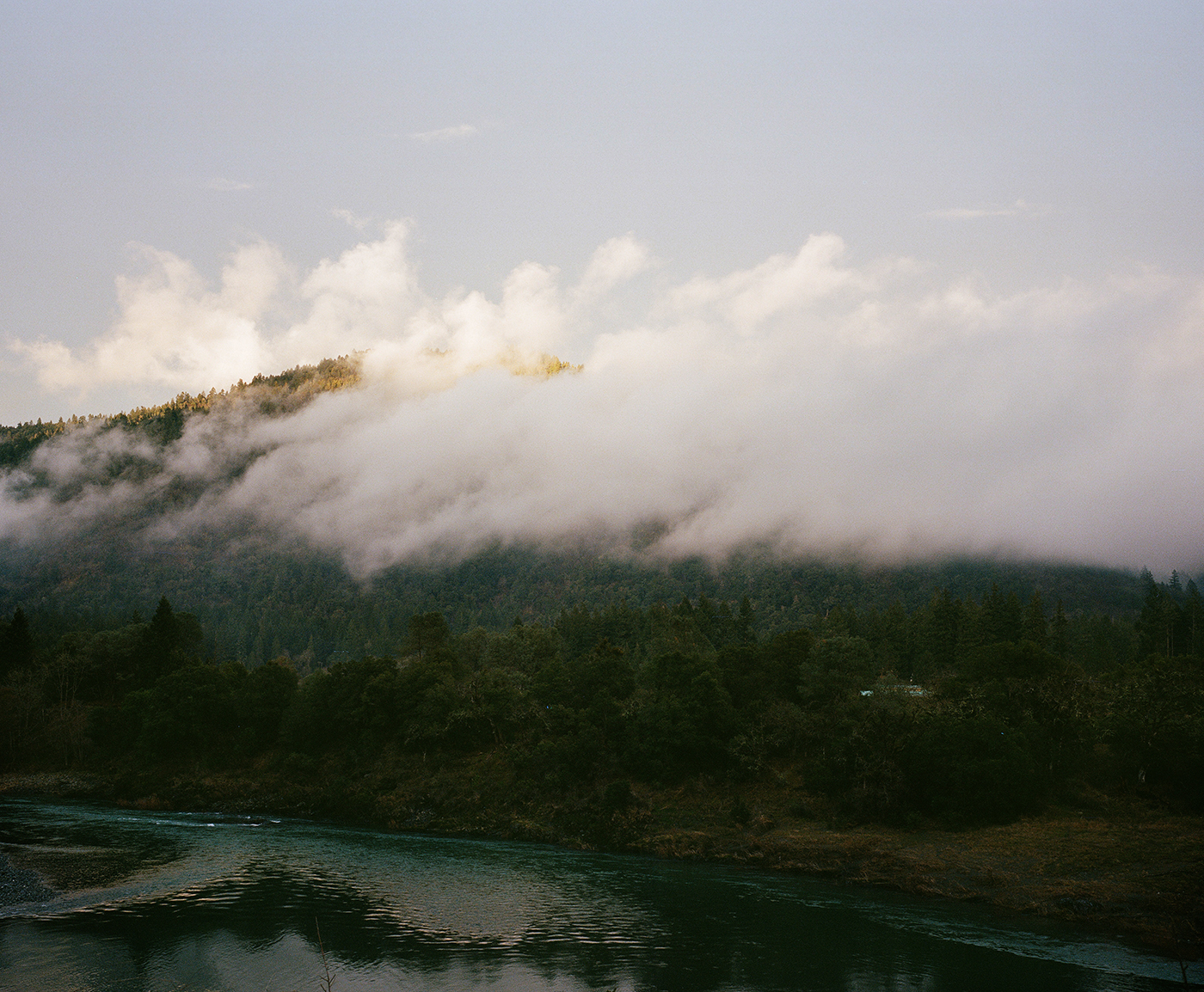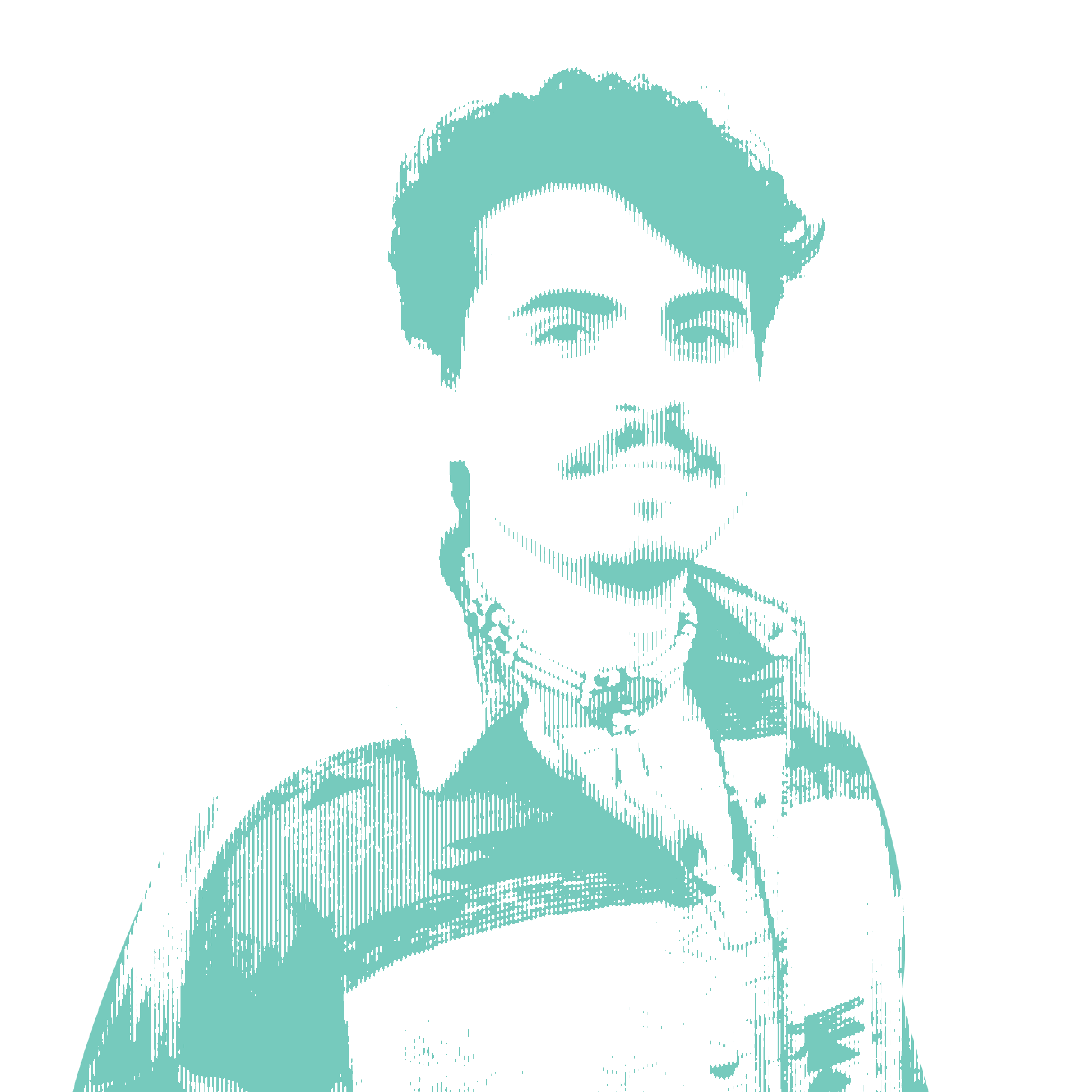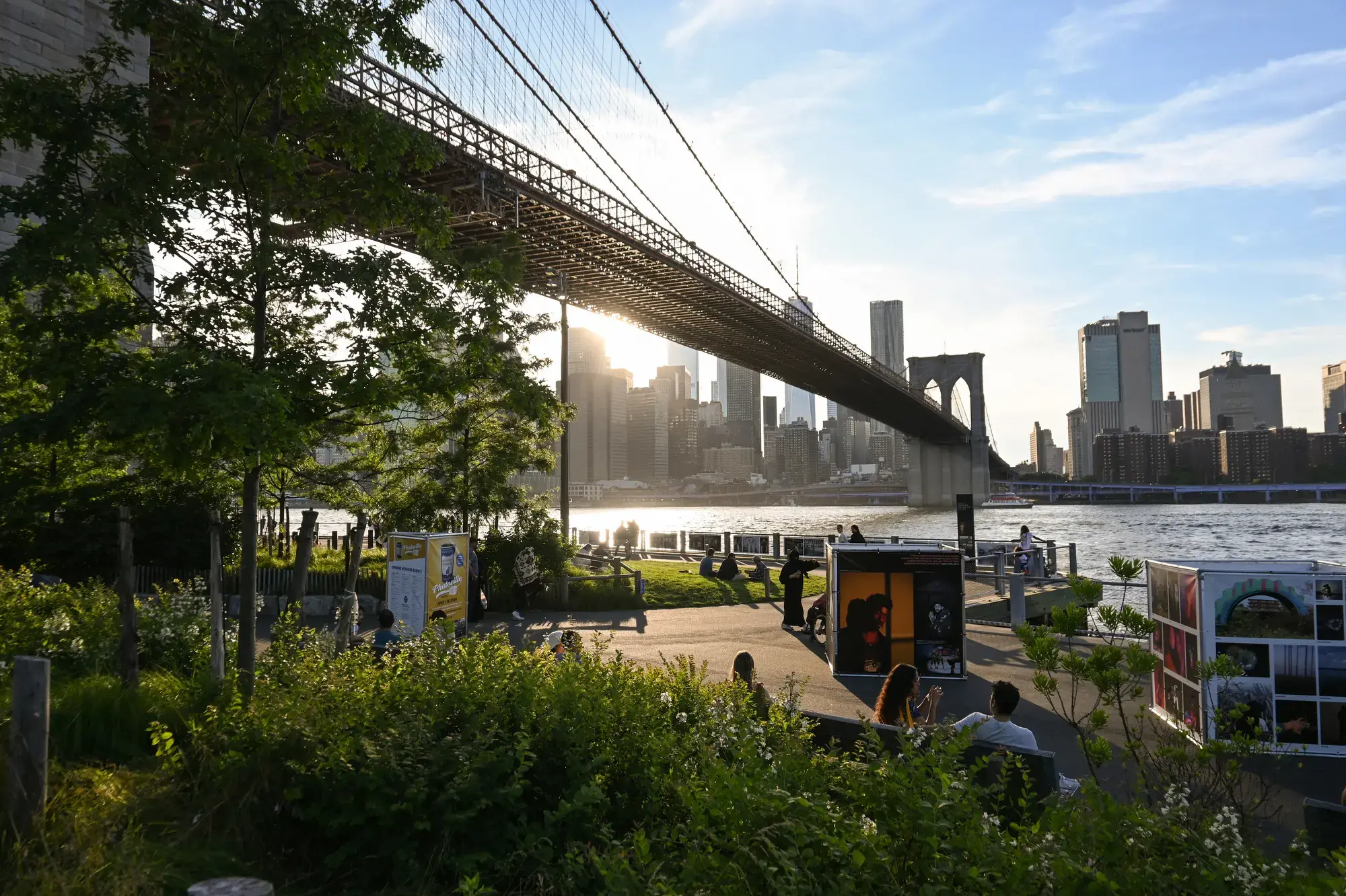
Underneath the Brooklyn Bridge, the sun shining through the trees, the buzz and rush of New York City was replaced by soft murmurs of curiosity and appreciation for photographic storytelling at the annual Photoville Festival opening weekend. As onlookers passed the photography exhibits, many sporting cameras of their own, they stopped to read and learn about issues ranging from Indigenous rights and public health to climate change.
“I saw that, and I said I have to go to this,” said Evelyn von Gizycki, who attended the Pulitzer Center-supported panel discussion on “Decolonizing Care: The Opioid Crisis and the Role of Trauma-Informed Storytelling” and walked to the “Decolonizing Care” exhibit with the group.
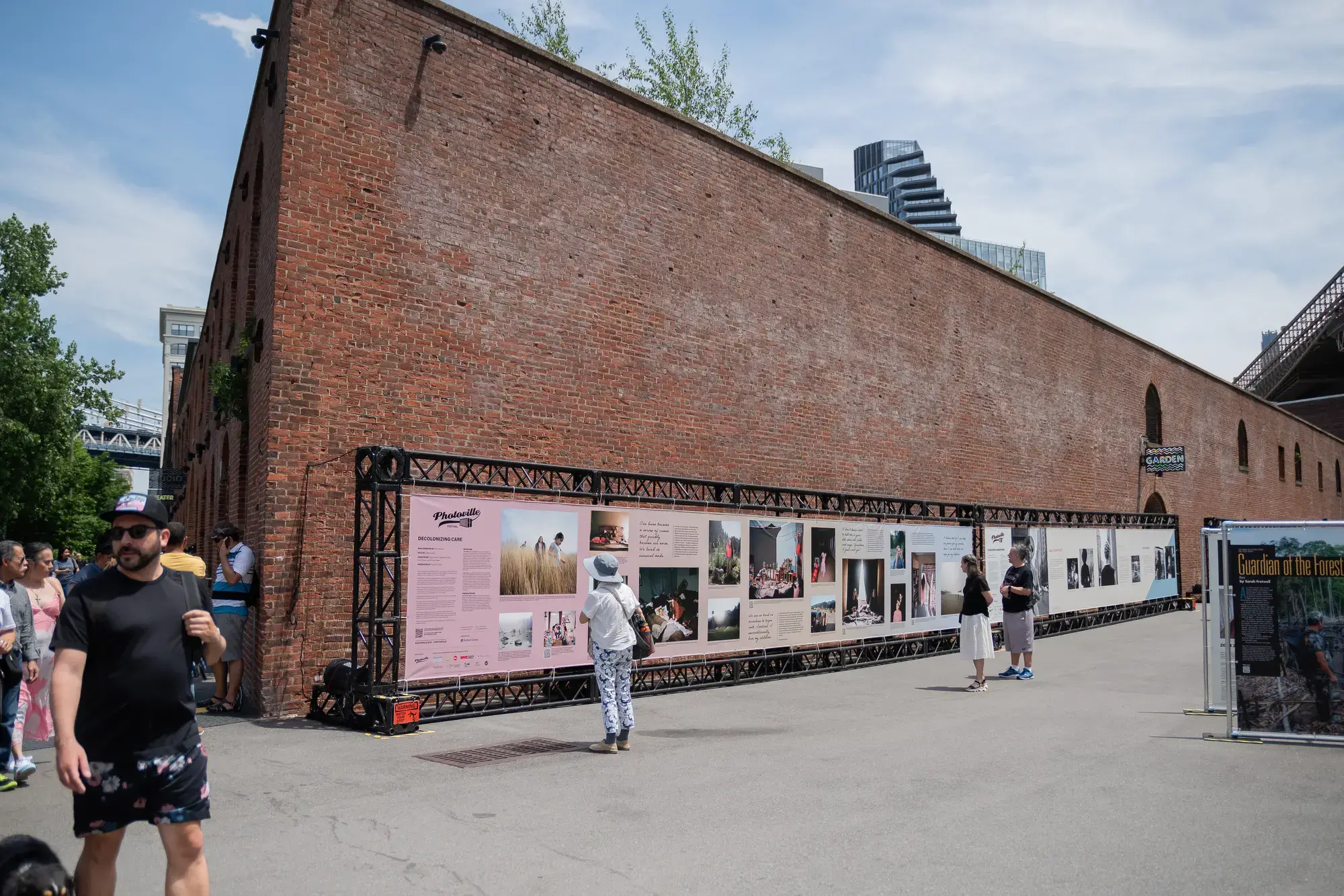
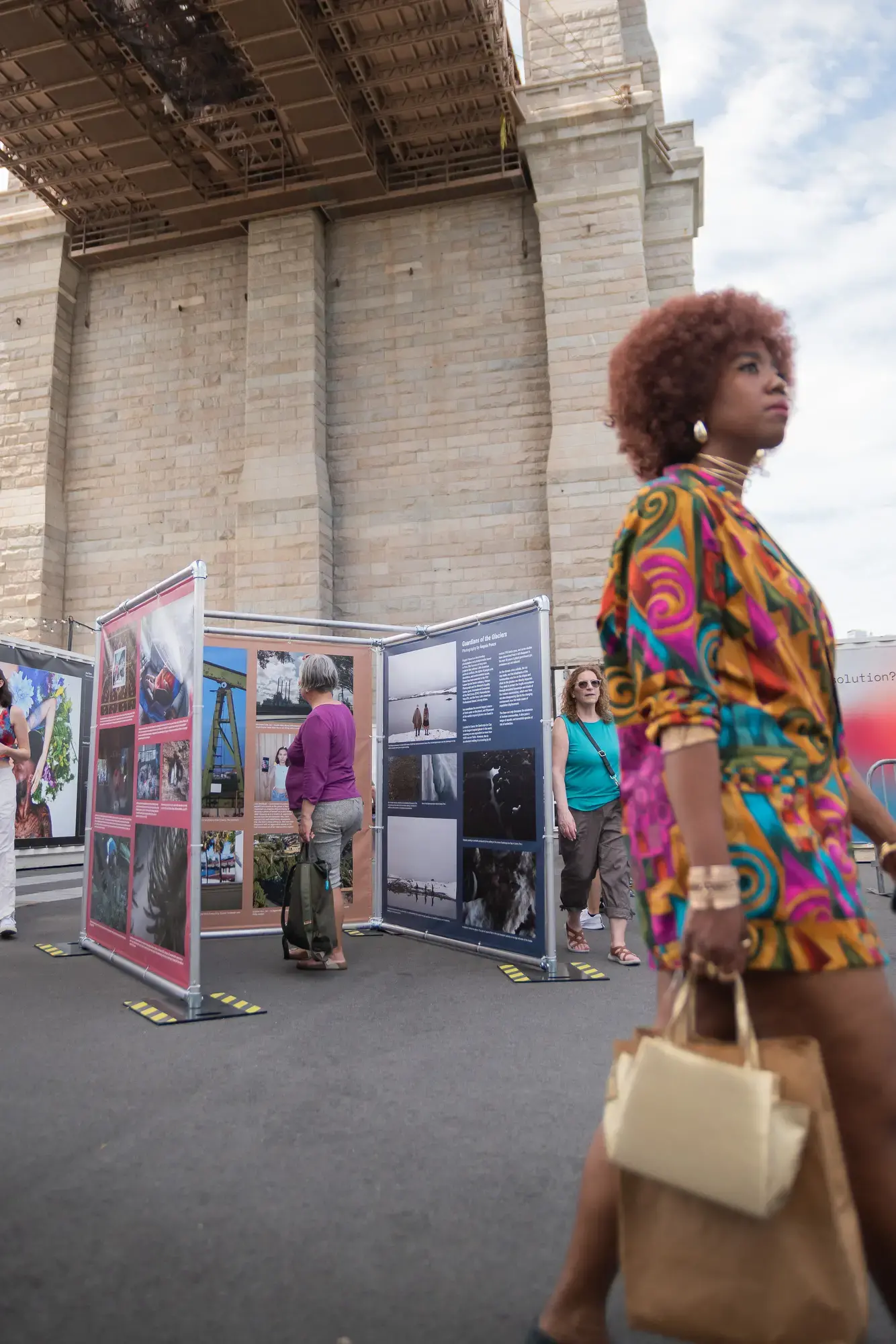
Von Gizycki admired the “Decolonizing Care” exhibit with photography by Justin Maxon and words by Judith Surber, which tells the story of how the opioid epidemic has affected the Hoopa Valley Indian Reservation in northern California.
“If I’m really interested to learn more about it, I think that a lot of other people will, too, and there will be a lot more awareness now,” she said.
We are now in our 10th year exhibiting Pulitzer Center-supported work at Photoville. The annual festival, held in New York City, has played a strong role in amplifying the visual journalism we support. We’re thankful for this partnership, which presents a fantastic opportunity to engage and connect with the public and photography communities in New York City and beyond.
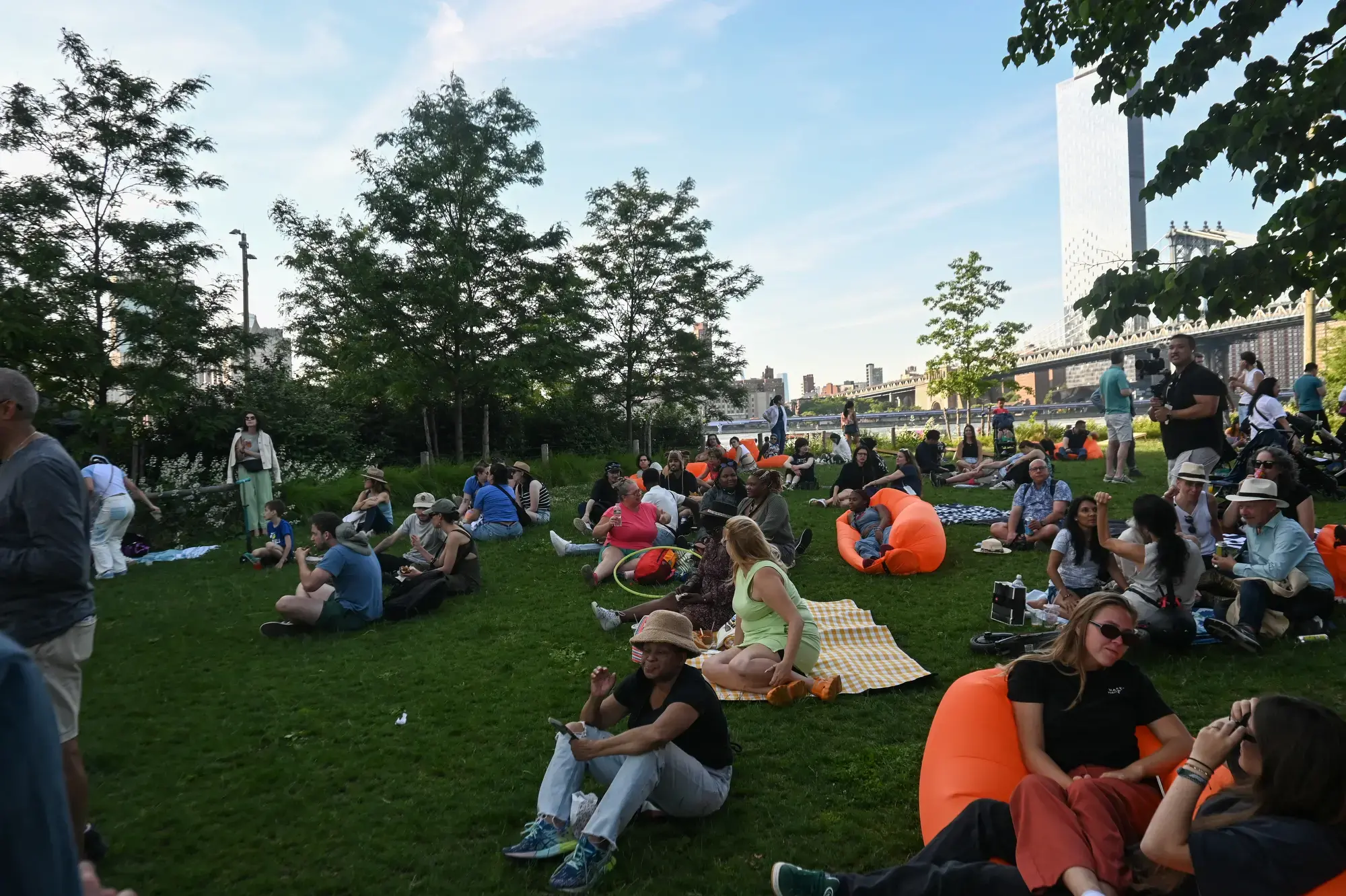
Photoville is a New York-based nonprofit organization that promotes a wider understanding of and increases access to the art of photography for all. Founded in 2011 in Brooklyn, Photoville produces an annual, city-wide open-air photography festival that is free and open to the public across all five boroughs of New York City.
We believe visual storytelling is a medium that compels viewers to engage and enrich their understanding of globally underreported issues. To increase the visibility of Pulitzer Center-supported photojournalism and reporting, we produced two exhibits highlighting key focus areas of our work. This year, the Center-supported exhibits explored a Native American family living through the opioid crisis in the United States and communities enduring the effects of climate change across the Americas. The exhibitions compelled audiences to dive deeper into environmental and global health issues.
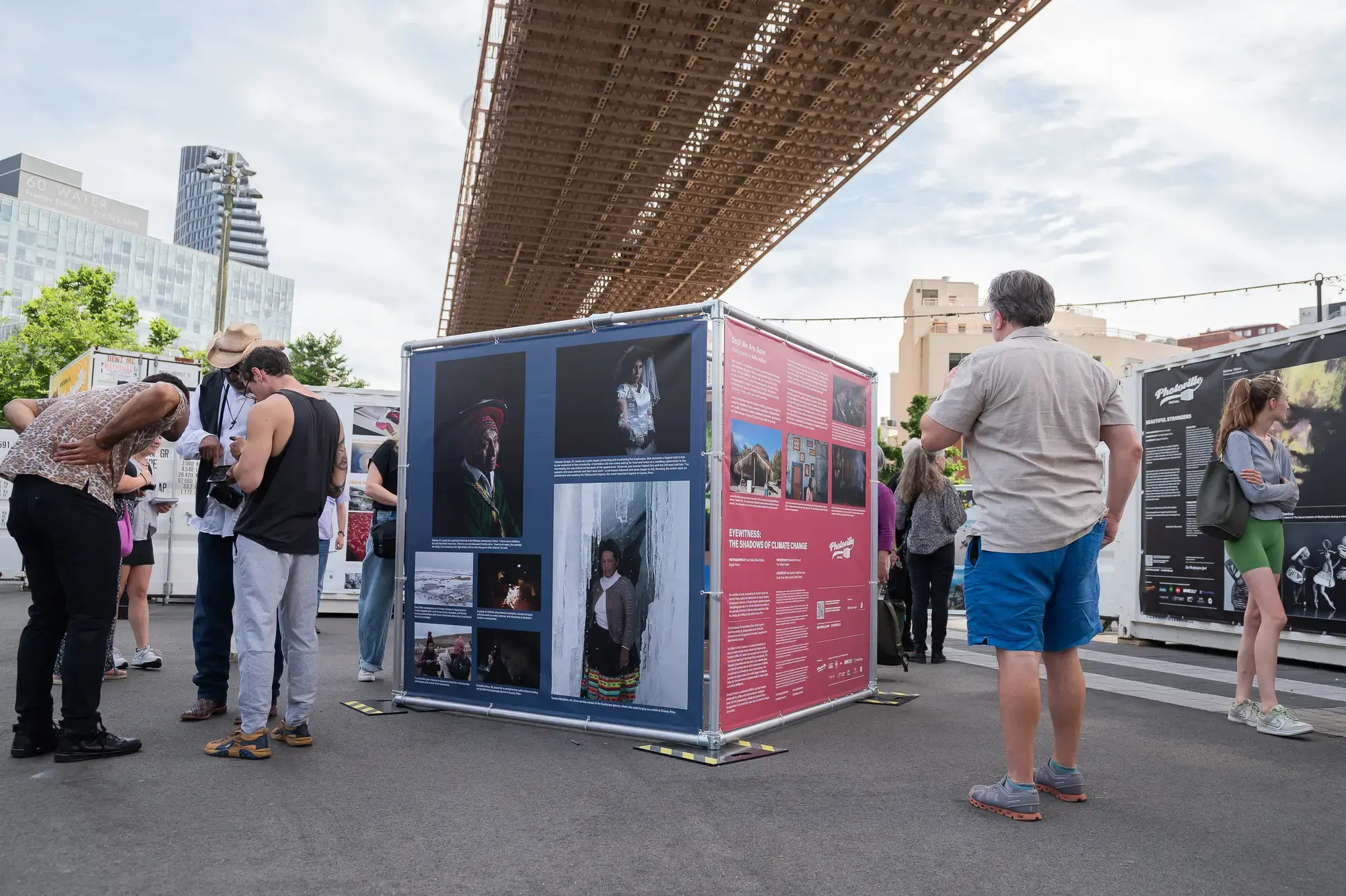
“Eyewitness: The Shadows of Climate Change”
Located at the heart of the festival in Brooklyn Bridge Park, our collaborative exhibition with Diversify Photo, “Eyewitness: The Shadows of Climate Change,” featured the work of 2023 Eyewitness Photojournalism Grant recipients Sofia Aldinio, Tara Pixley, and Ángela Ponce. This exhibit explored the intersections of erasure, injustice, and resilience in the face of climate change's relentless advance. The photography takes viewers to climate-affected communities in the sunny hills of southern California in the U.S., fading coastlines in Baja Sur, Mexico, and melting ice caps above Cusco, Peru.
The Eyewitness Photojournalism Grant supports visual storytelling by photojournalists from historically underrepresented backgrounds. The print exhibit was overlooked by the Brooklyn Bridge, with the East River as a backdrop. The exhibit also has a virtual companion exhibit, where audiences can explore a 3D space featuring the work.
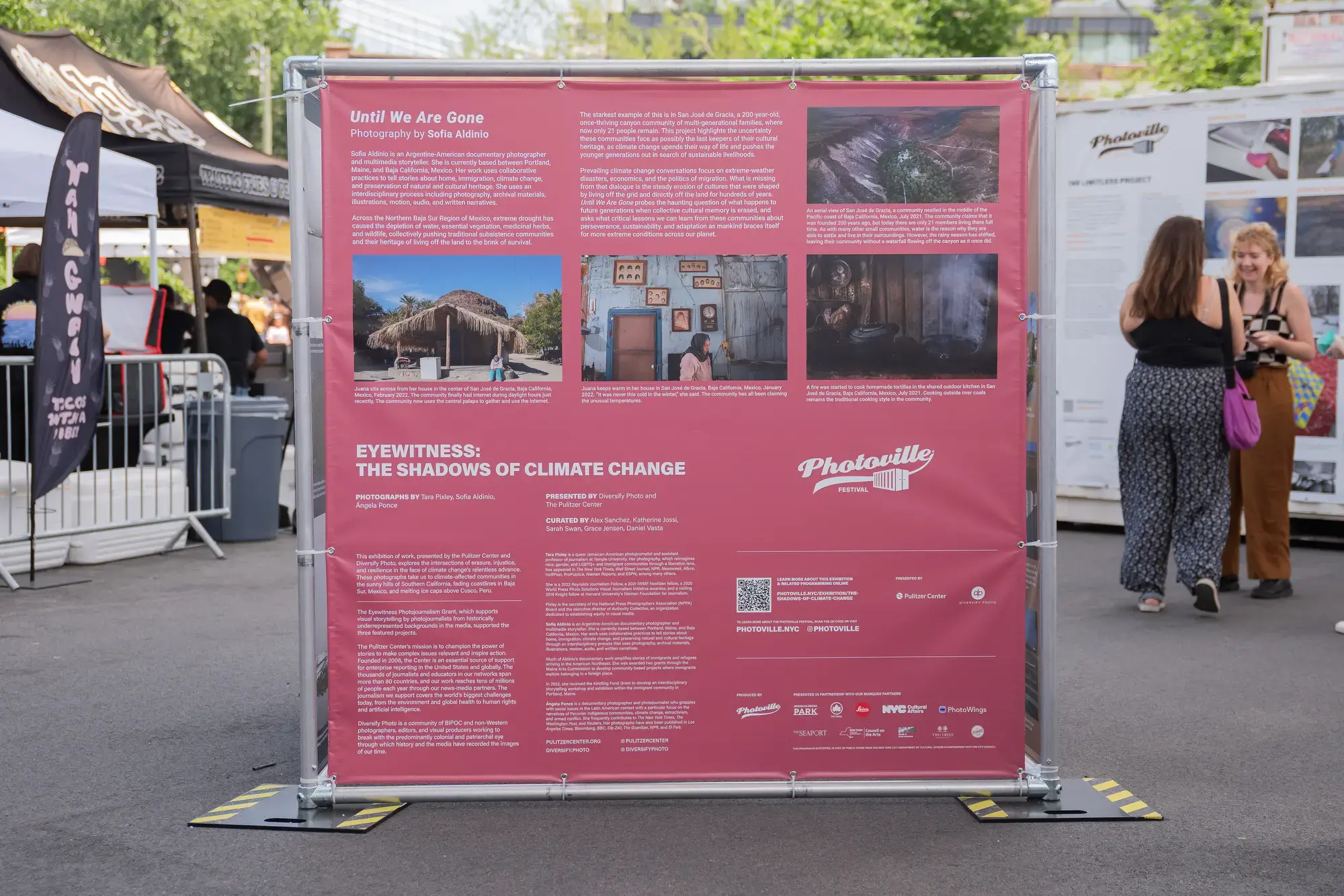
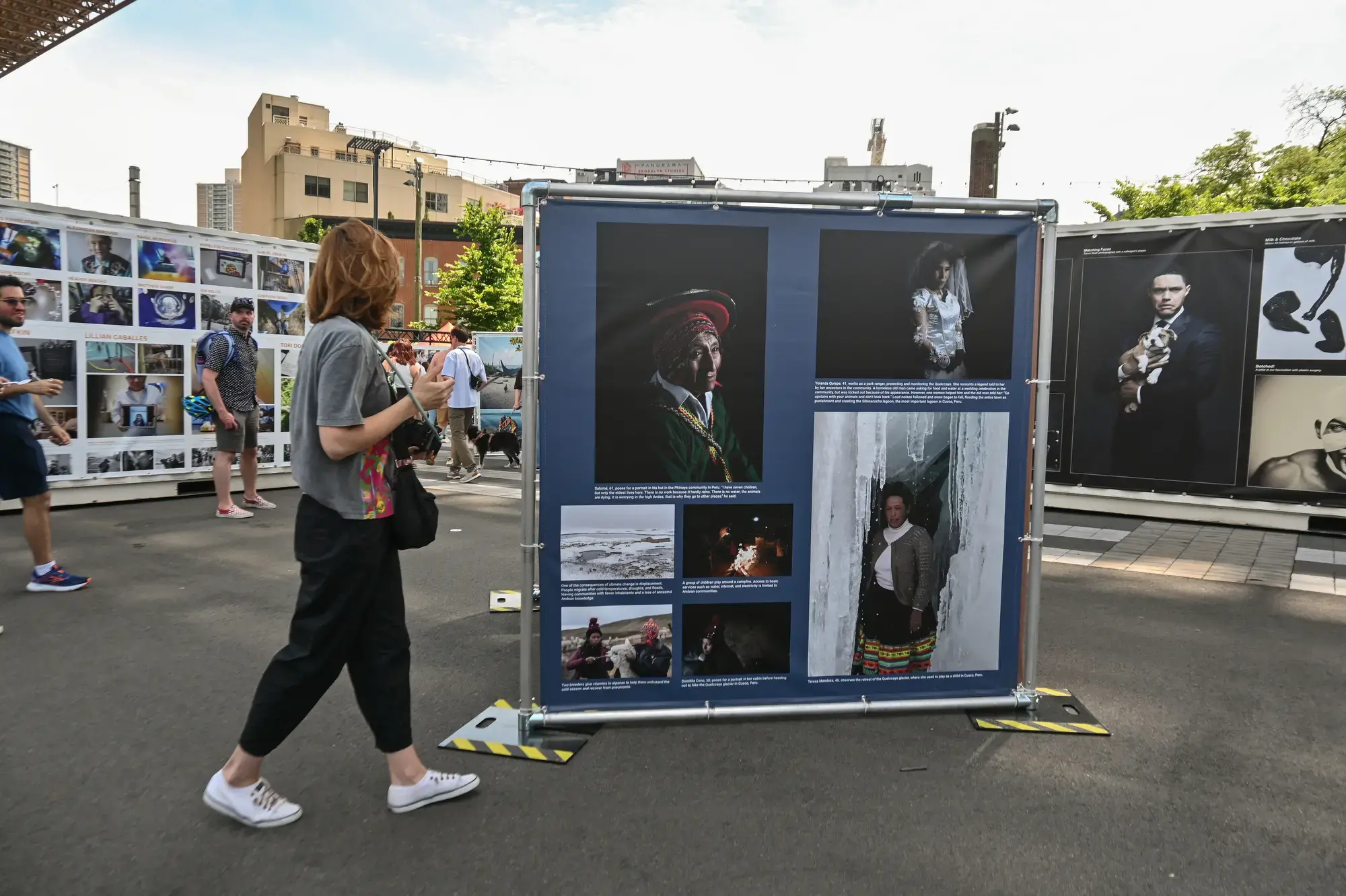

Tara Pixley’s Immersed in Oil documents the neighborhoods most affected by fossil fuel production in southern California, visualizing the everyday impacts on the minority communities living in close proximity to drilling sites.
Sofia Aldinio’s Until We Are Gone probes the haunting question of what happens to future generations in Baja Sur, Mexico, when collective cultural memory is erased, and asks what critical lessons we can learn about perseverance, sustainability, and adaptation from these communities as humanity braces itself for more extreme conditions across our planet.
Ángela Ponce’s Guardians of the Glaciers documents how the inhabitants on the slopes of the Quelccaya Ice Cap in Cusco, Peru, are directly impacted by the climate crisis and melting glaciers. They seek to protect the fragile ecosystems through ancestral knowledge and rituals of the Andean cosmovision. Over time, this knowledge is also disappearing due to the changing environment, now the main cause of population displacement.
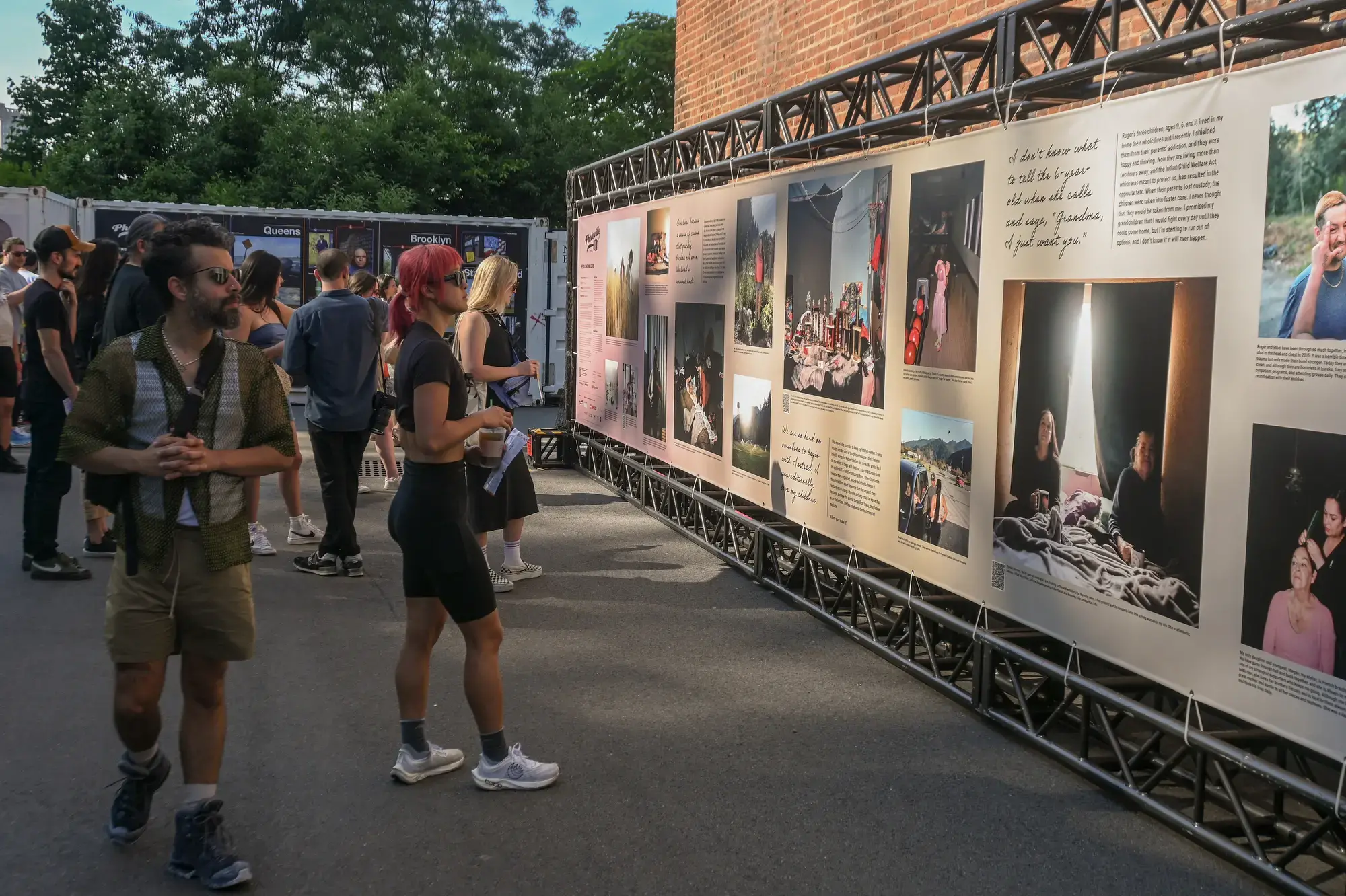
“Decolonizing Care”
The “Decolonizing Care” exhibit featured Pulitzer Center-supported work by photographer Justin Maxon and writer Judith Surber, who give an intimate account of how the opioid epidemic has devastated Surber’s family and community on the Hoopa Valley Indian Reservation in northern California. Justin Maxon creates images that present snapshots of Surber's life through a lens of empathy, understanding, and emotional nuance.
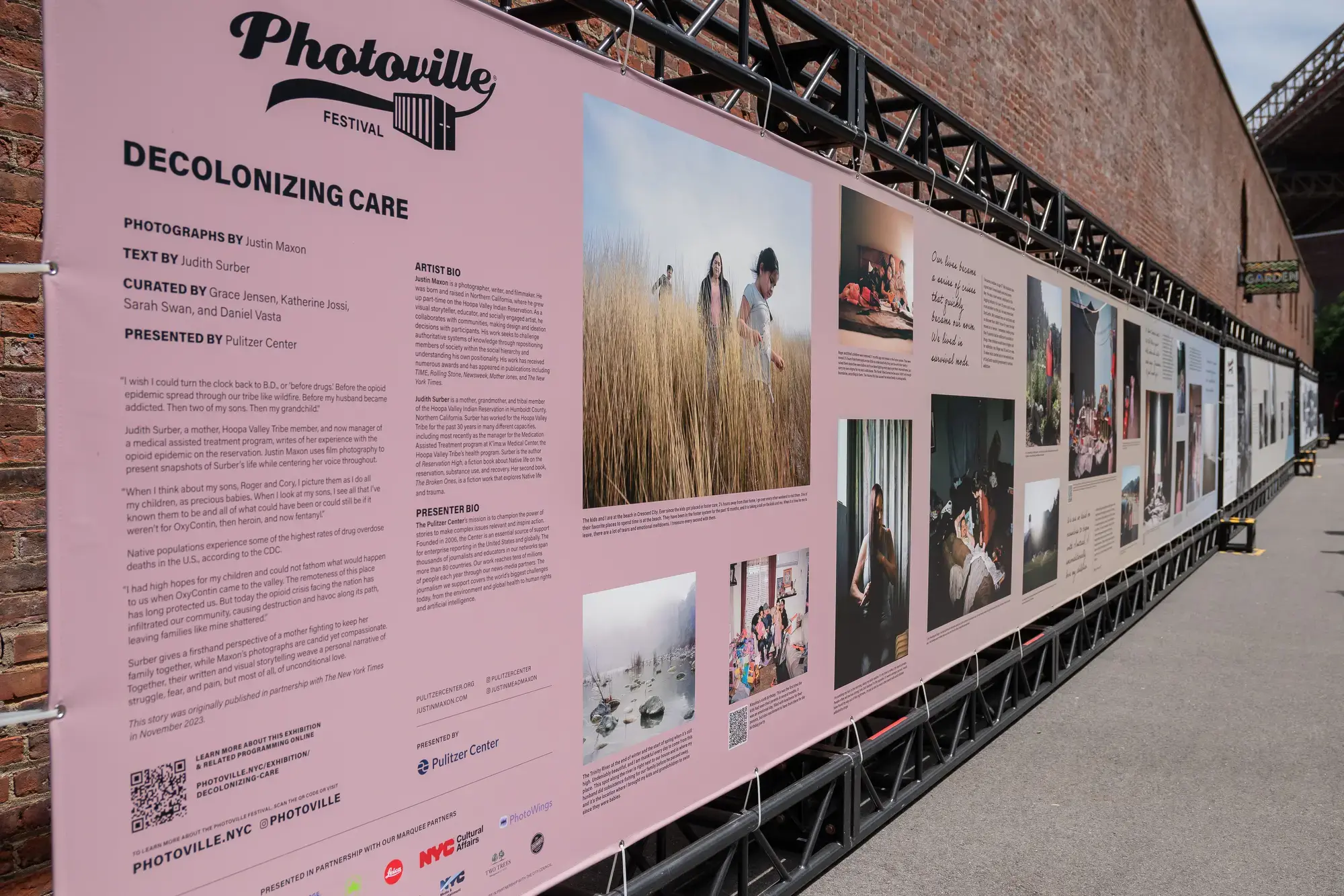
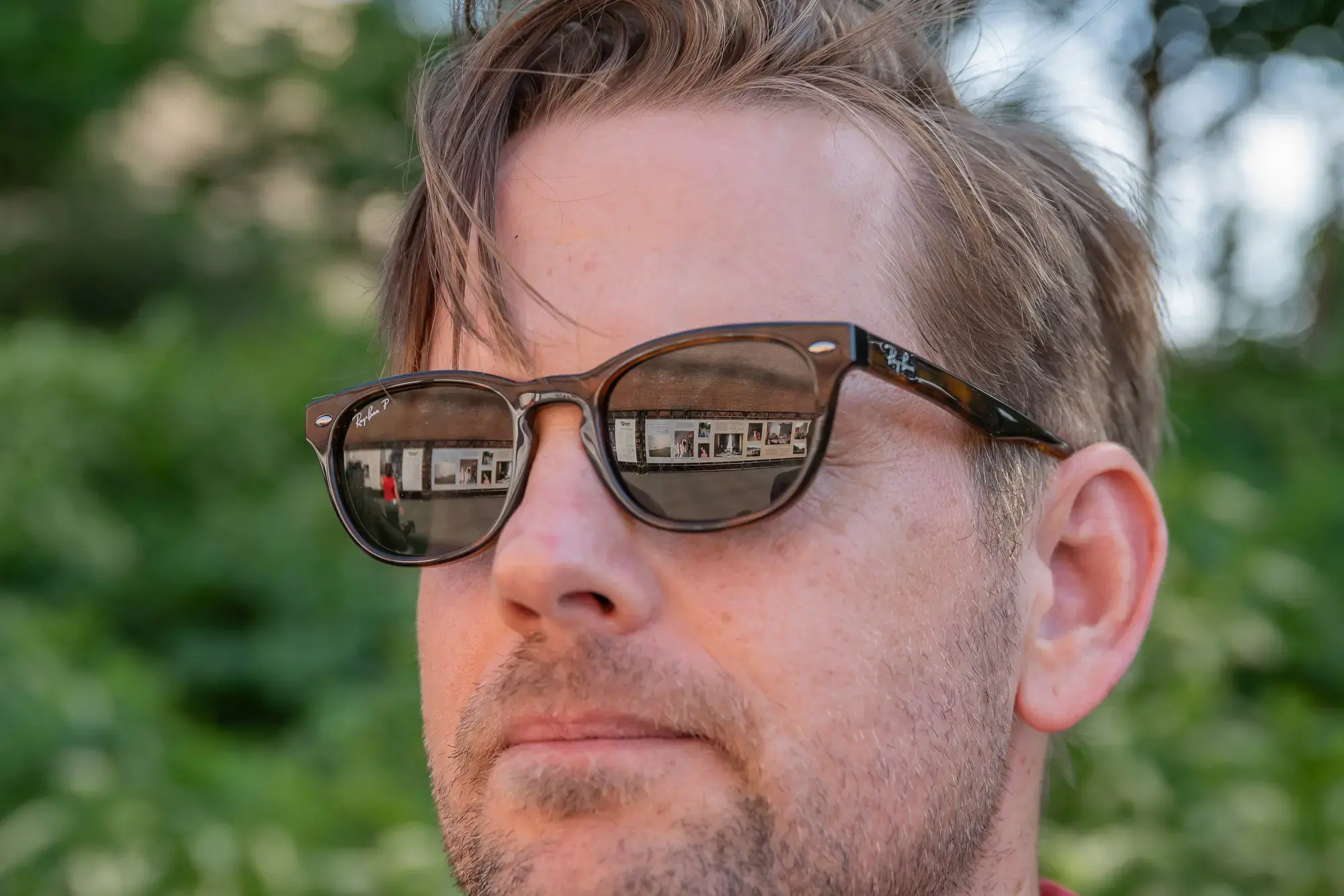
In addition to the printed materials, we are also featuring a digital publication of the exhibit, which includes multimedia content that expands the story, adding more depth and nuance for audiences to explore. This content was accessible to in-person visitors via QR codes printed with the exhibit and will remain accessible to virtual audiences.
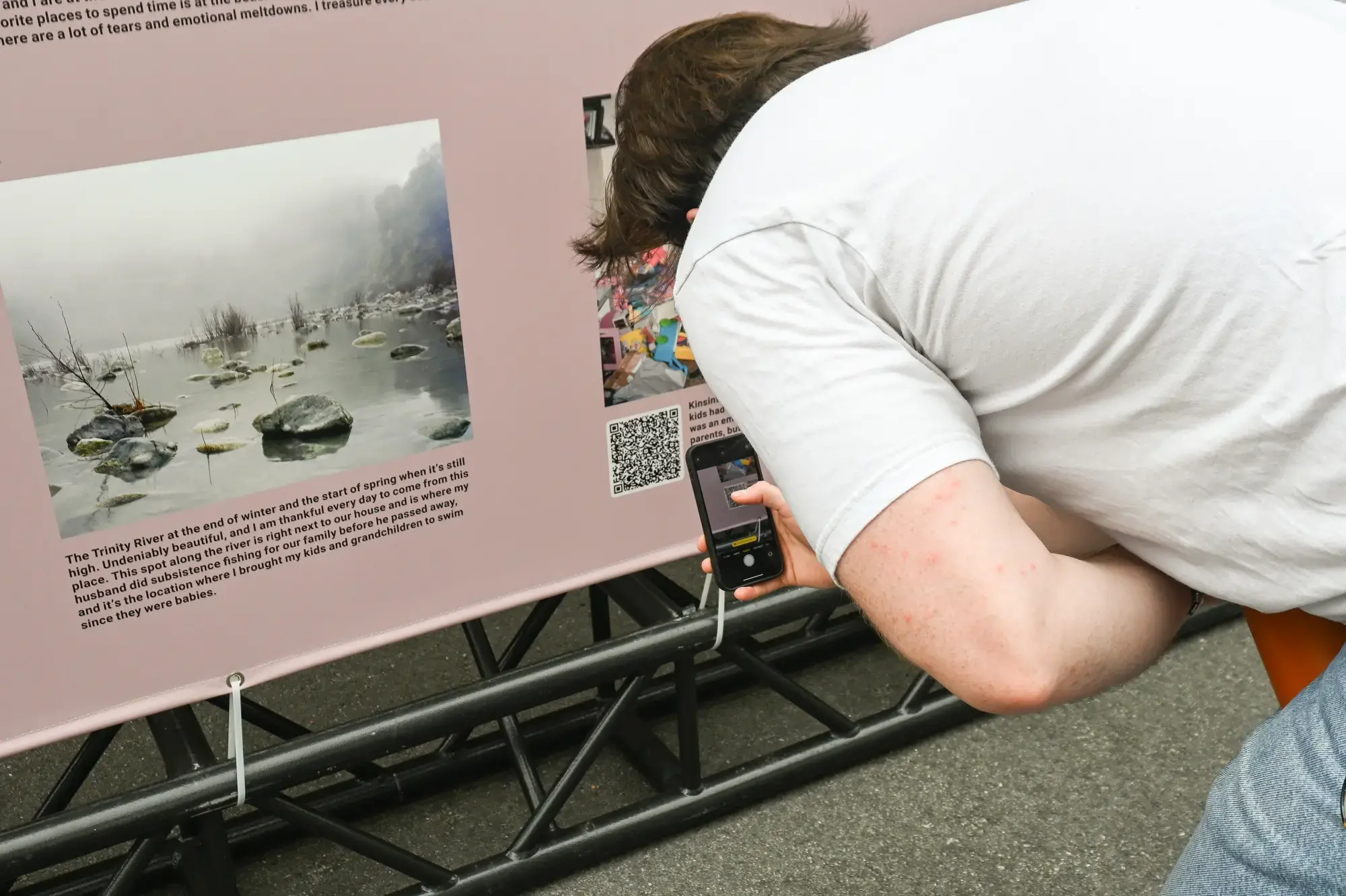
Connecting with Festival Attendees
The exhibit’s opening weekend kicked off with a panel discussion at the Adams Street Library between photographer Justin Maxon and writer Judith Surber about the opioid crisis and its impacts on Indigenous communities. The discussion covered trauma-informed storytelling and how the process of collaborating with and centering community voices can reframe preconceived narratives about complex topics such as substance abuse.
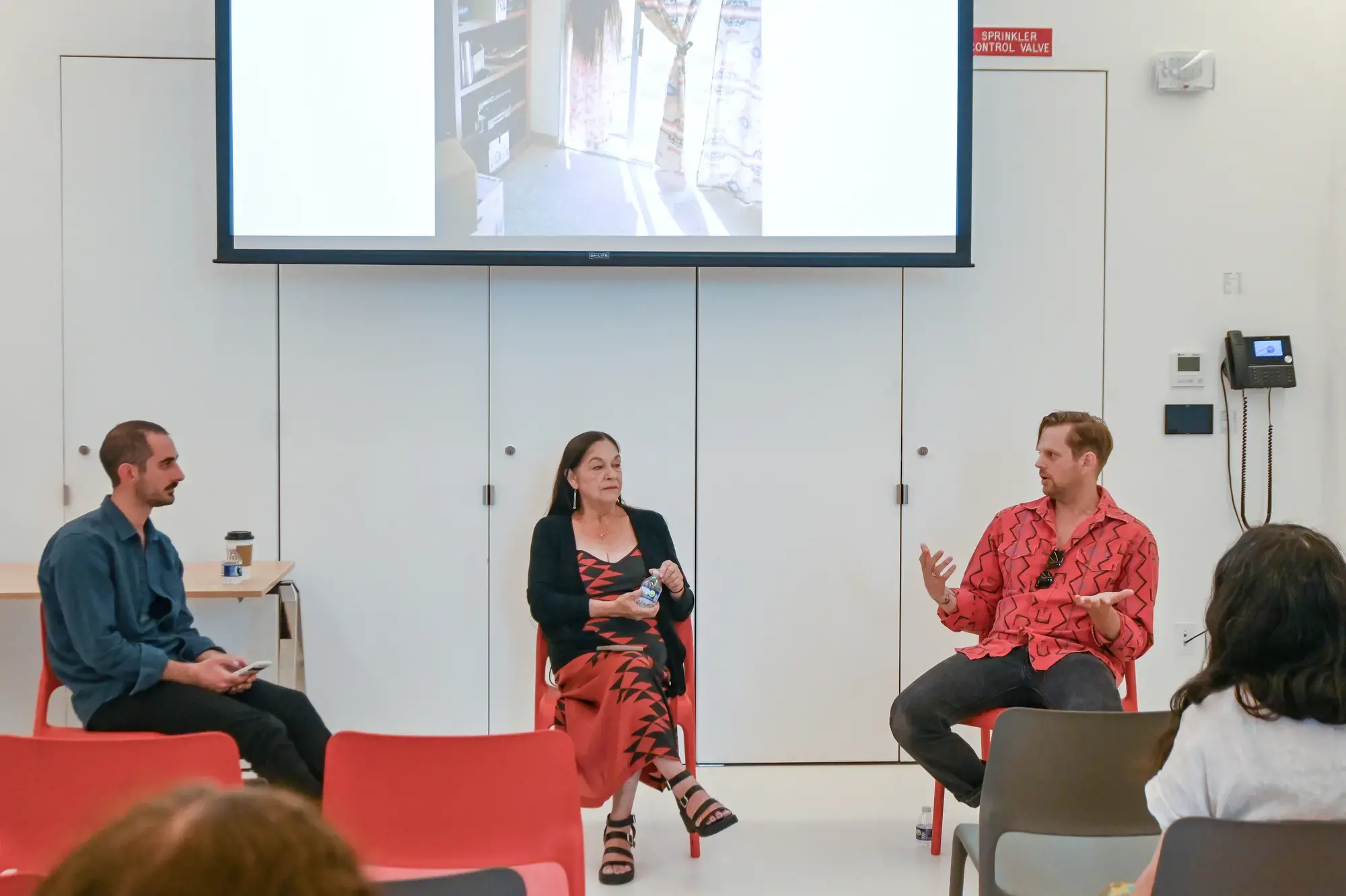
Surber discussed how important access to treatment is within the community, and how the lack of consistent treatment plans creates a barrier for those seeking recovery. With only two methadone clinics in the area, Surber outlined the transportation program they had set up in Hoopa to get people to and from the clinics. She also touched on the need for cultural resiliency programs, focusing on preserving the tribal language, storytelling, and community inclusion as successful practices for those in recovery.
Maxon discussed the lasting ramifications of media depictions of addiction on both the public’s perception of recovery and those featured in the photographs. He left the audience with reflections on how he creates intention in his photography and work, saying he captures Surber and her family as if it were a family photo album.
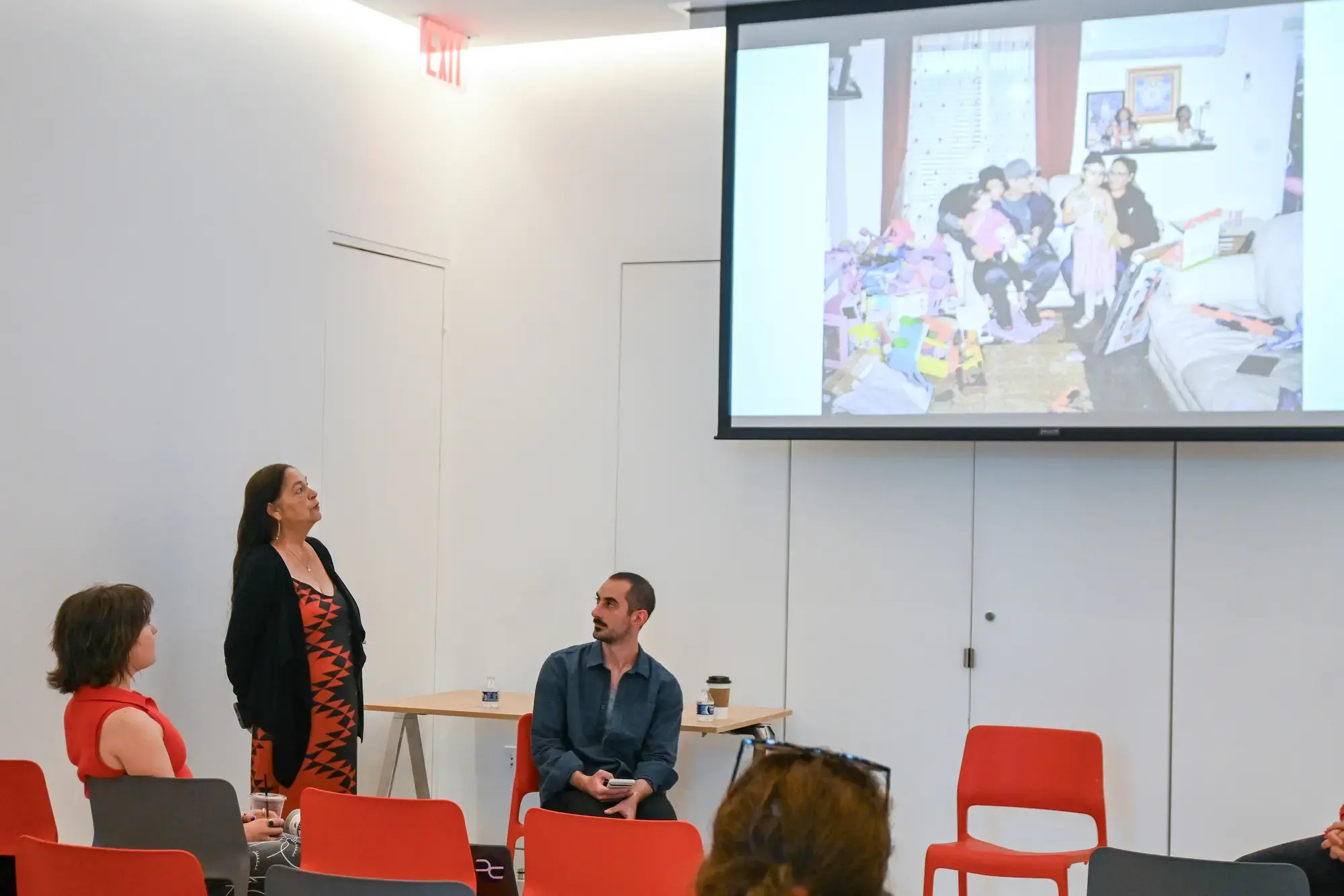
After the discussion concluded, Surber and Maxon engaged in a short question-and-answer session with the audience, followed by a walk to the exhibit with Pulitzer Center staff.
“This was important to me, but also the presentation [is] beautiful,” said attendee Evelyn von Gizycki. “It was dynamic: We walked here from another event, this location is amazing, and the way this is presented, it has a large impact this way. I’m very interested in Photoville and I want to get involved in this whole thing myself.”
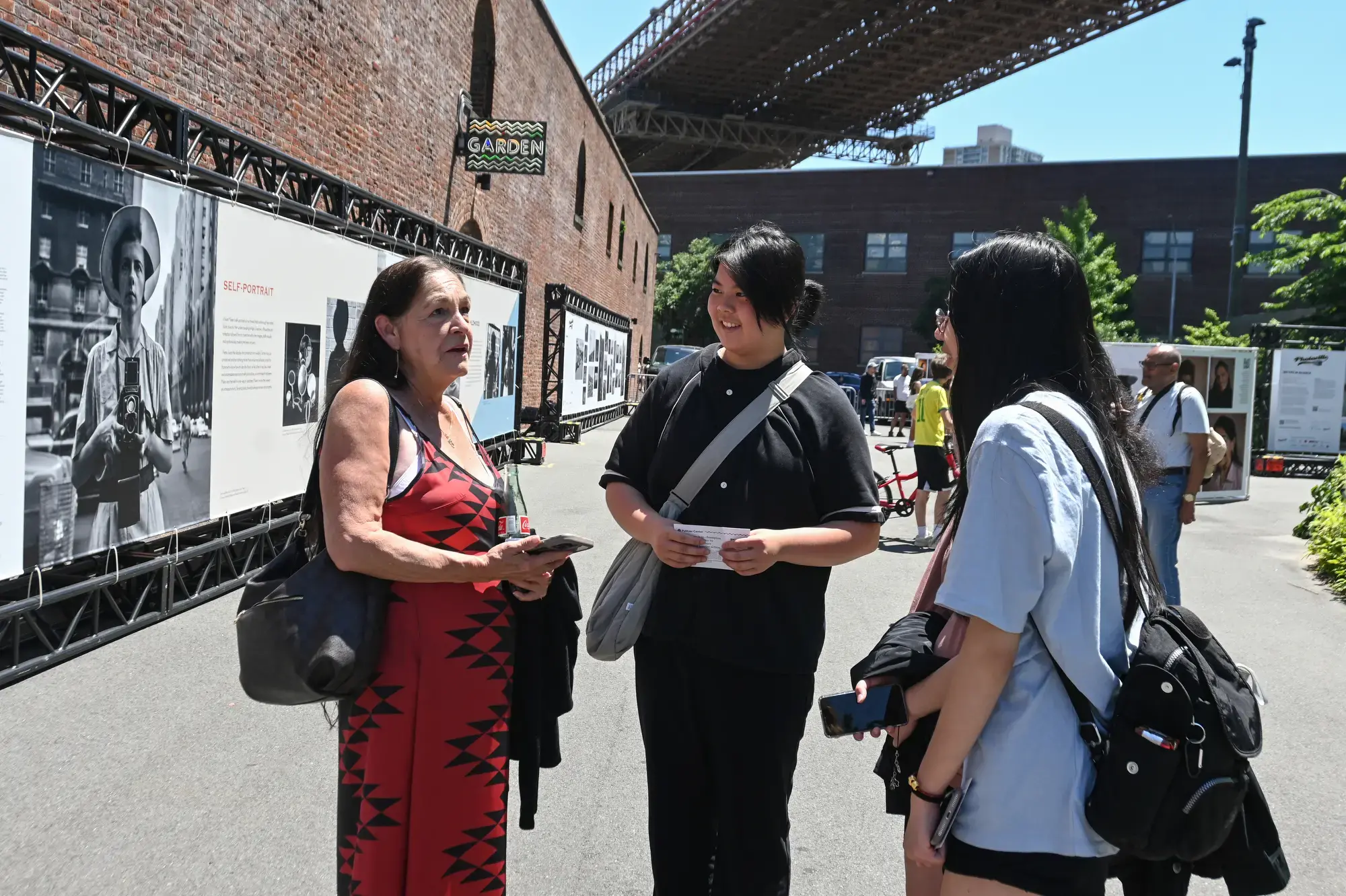
“I know the work of Justin and of Judy, and it’s really special to see them in dialogue with other folks,” said Sruti Suryanarayanan, another attendee. “I think this is a really important type of story that Justin and Judy are telling together, what they talked about in their talk. It’s important to shed different lights on this story that’s often told only in one way to help one person, rather than being told by the people who the story is about and for. And I think that’s what Justin and Judy do really beautifully.”
As part of the opening weekend activities, “Decolonizing Care” was a featured stop on the “Photoville Team Curated Walking Tour,” led by Photoville Executive Director and co-founder Laura Roumanos. Leading a group of festival attendees, Roumanos introduced the exhibit and encouraged attendees to engage with the exhibit, read the story, and spend time with the photography. Maxon and Surber also had the chance to speak with the audience about their work and provide an insider perspective on the creation and motivation of the project.
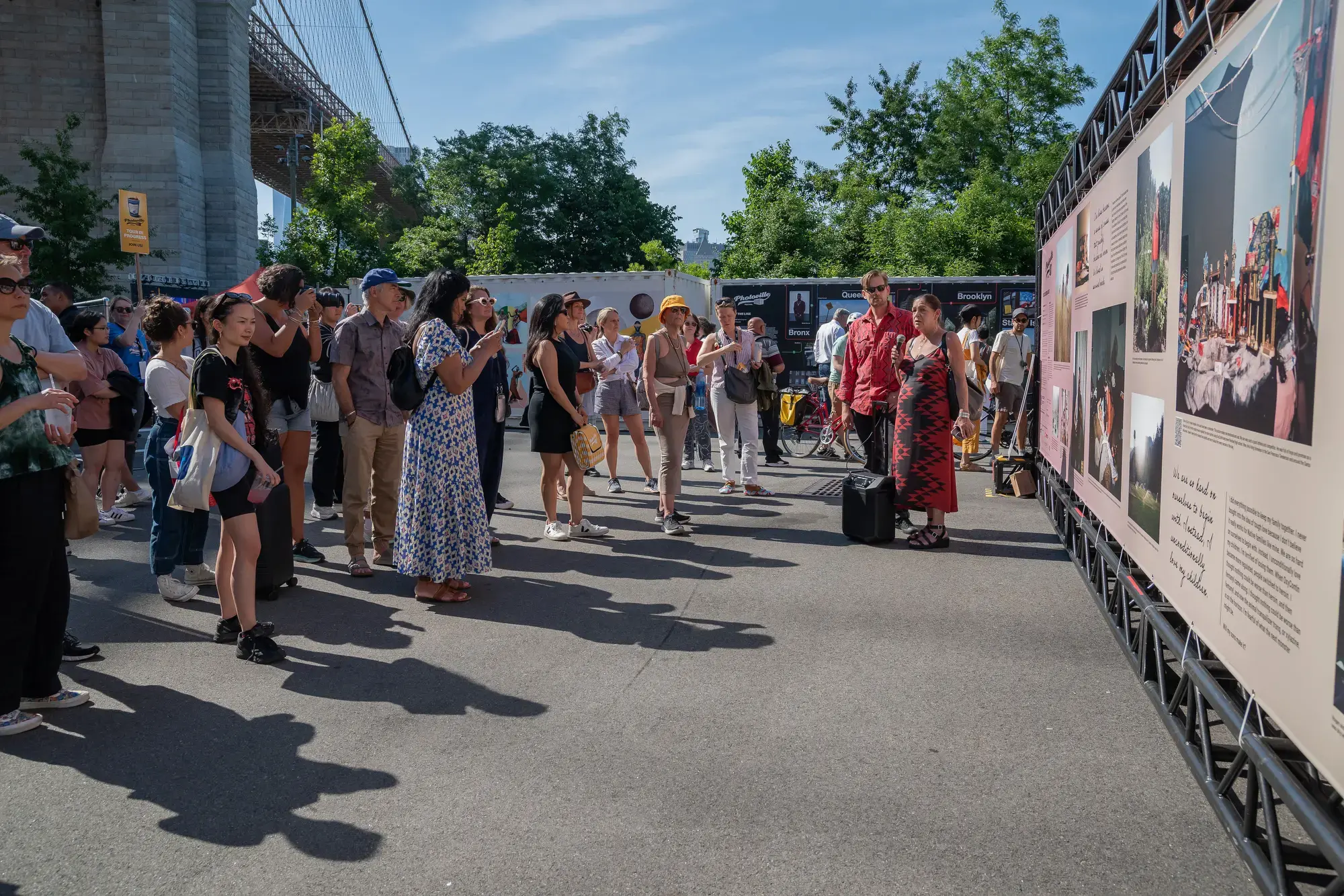
Engaging Students and Educators
Embracing the Pulitzer Center’s mission of engaging educators and young people with underreported stories, Justin Maxon spoke with multiple classrooms of students as part of Photoville’s Education Day programming on Tuesday, June 4. Each year, Photoville Education Days bring thousands of middle and high school students to the festival to connect with artists at their exhibits and participate in youth artist panel talks.
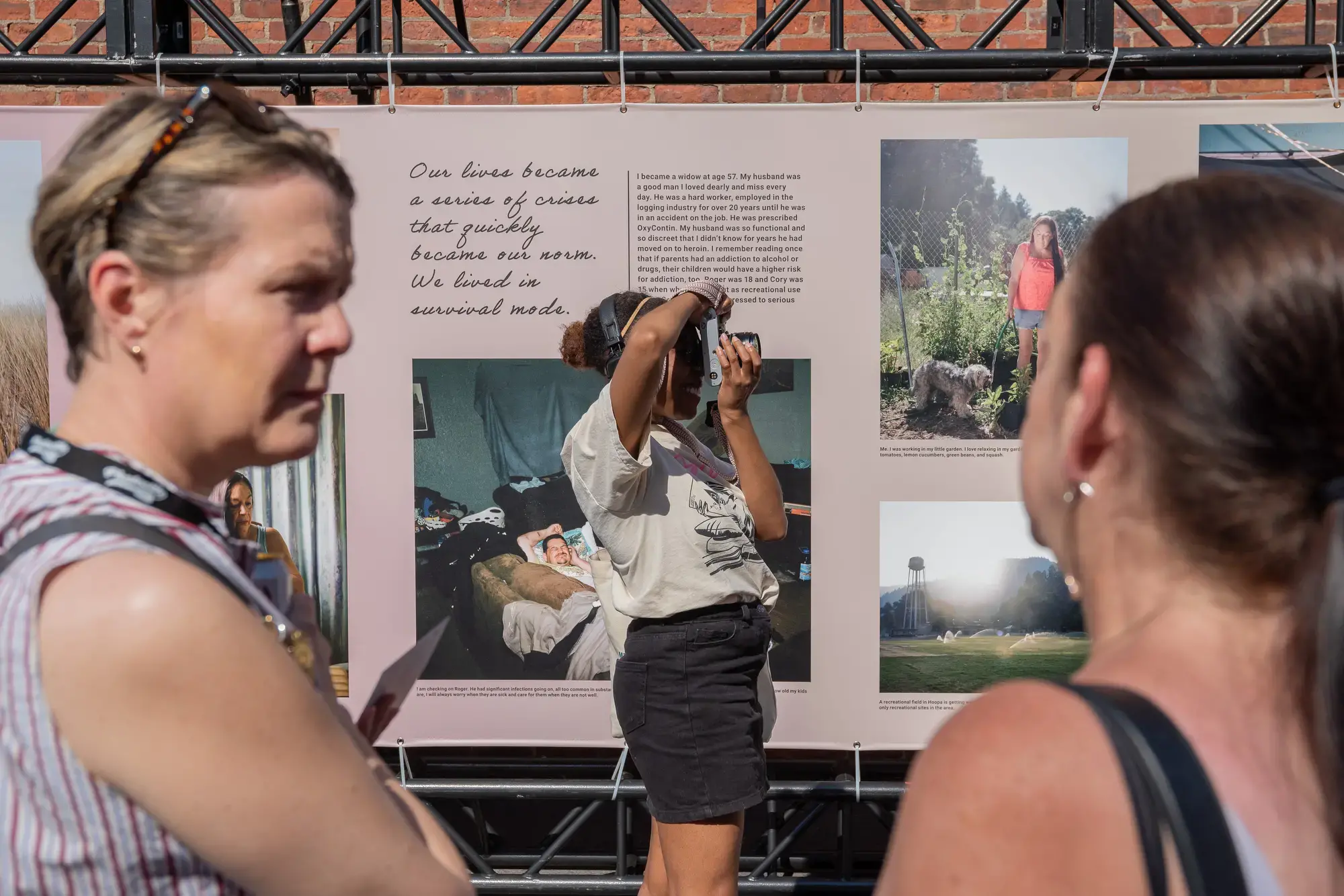
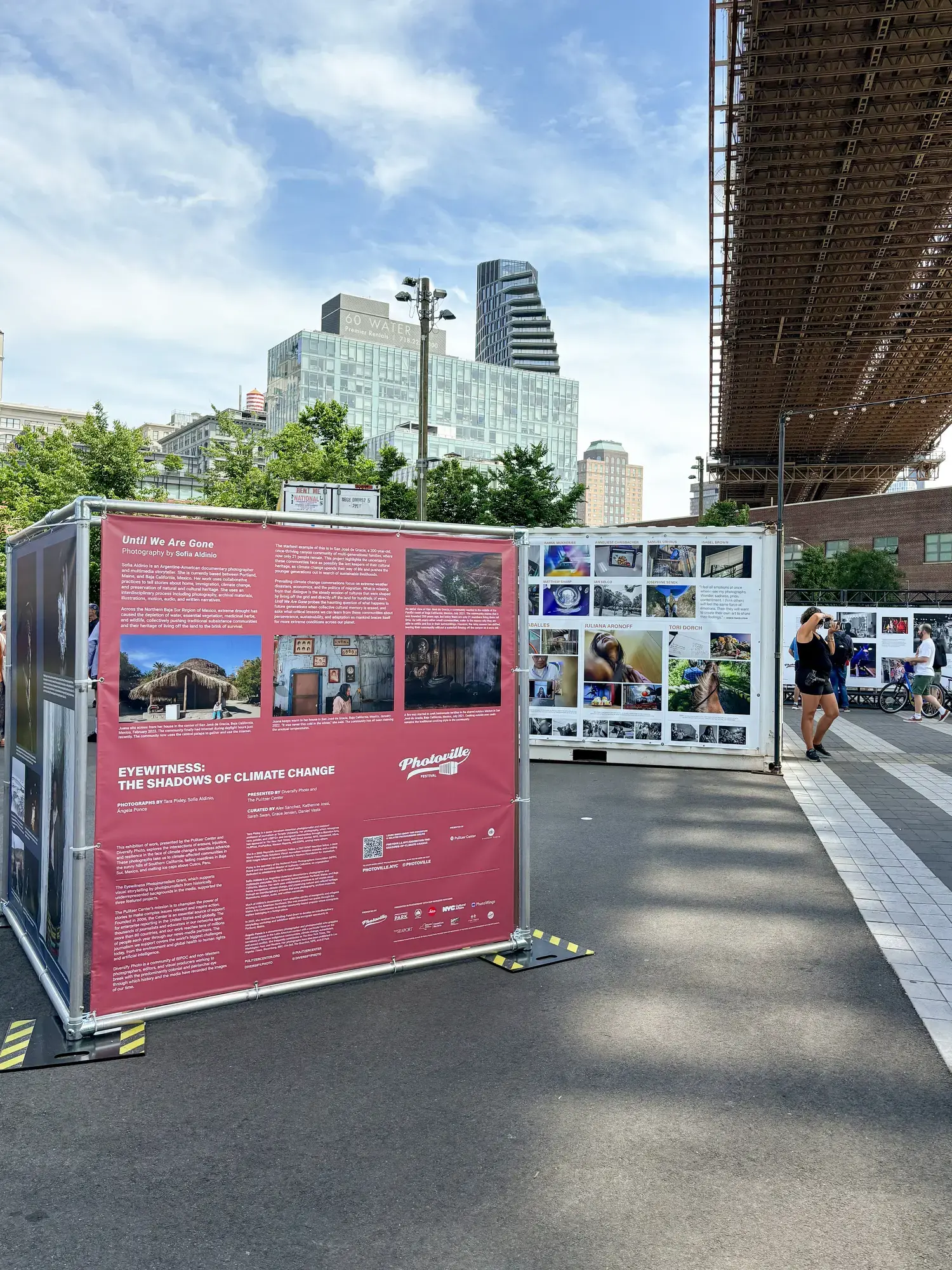
“As an exhibiting artist, it's often hard to gauge people's reactions when they pass by your work in silence. Education Day gave me the opportunity to really understand how my work landed,” Maxon said. “As an educator, I've not seen youth more engaged and responsive to the exhibitions than they were during the Education Day. The youth brought their unique lived experiences into the conversation, enriching it in ways that would be impossible for an artist alone. Their approach was courageous, caring, sensitive, and responsive. Engaging with the youth during Education Day was by far one of the highlights of my experience at Photoville.”
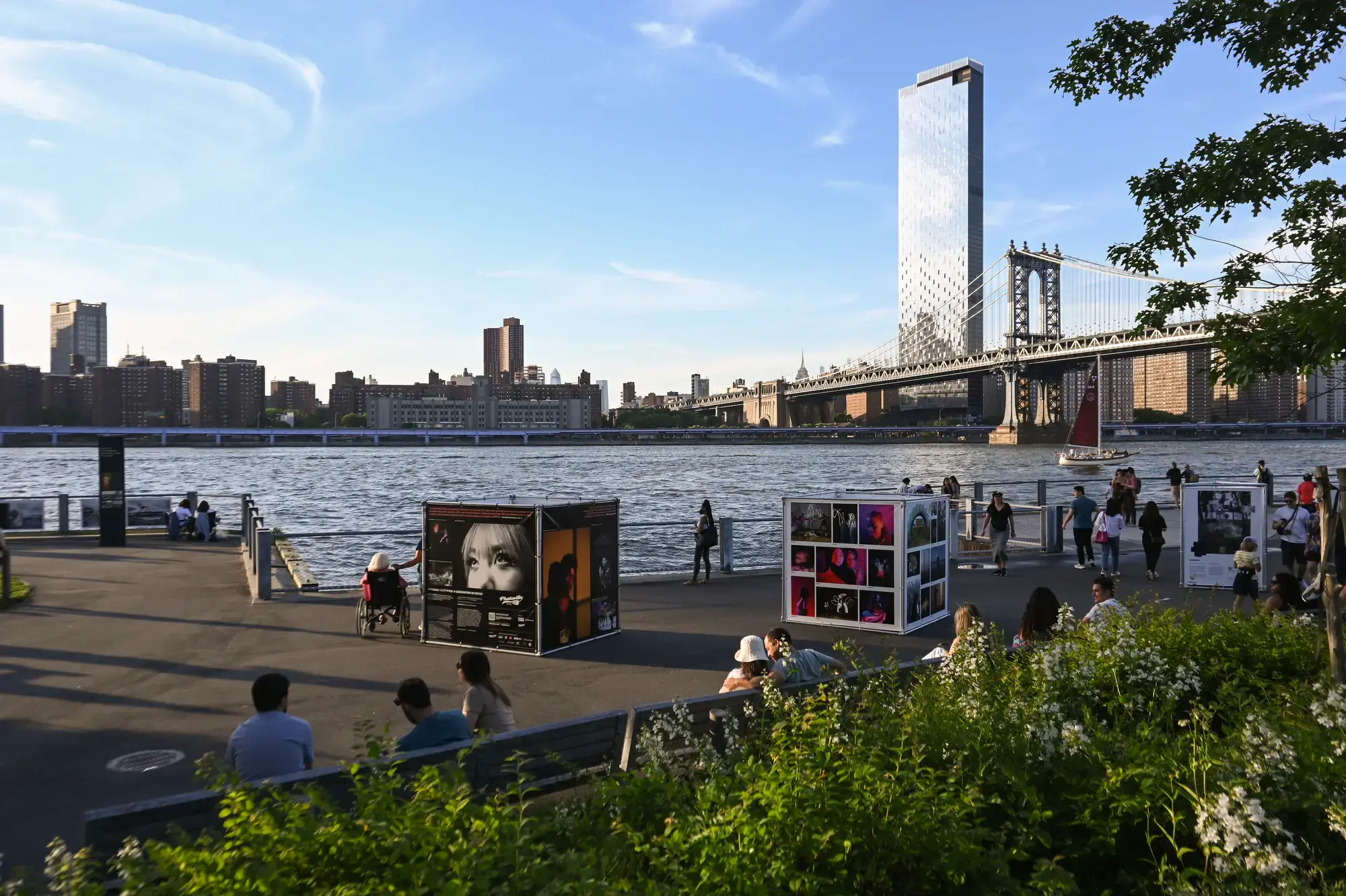
Project
Guardians of the Glaciers
The devastation that climate change is causing in the Andean communities of Peru, and the struggle...
Project
Immersed in Oil
Primarily Black and brown neighborhoods have long borne the brunt of the oil infrastructure’s health...
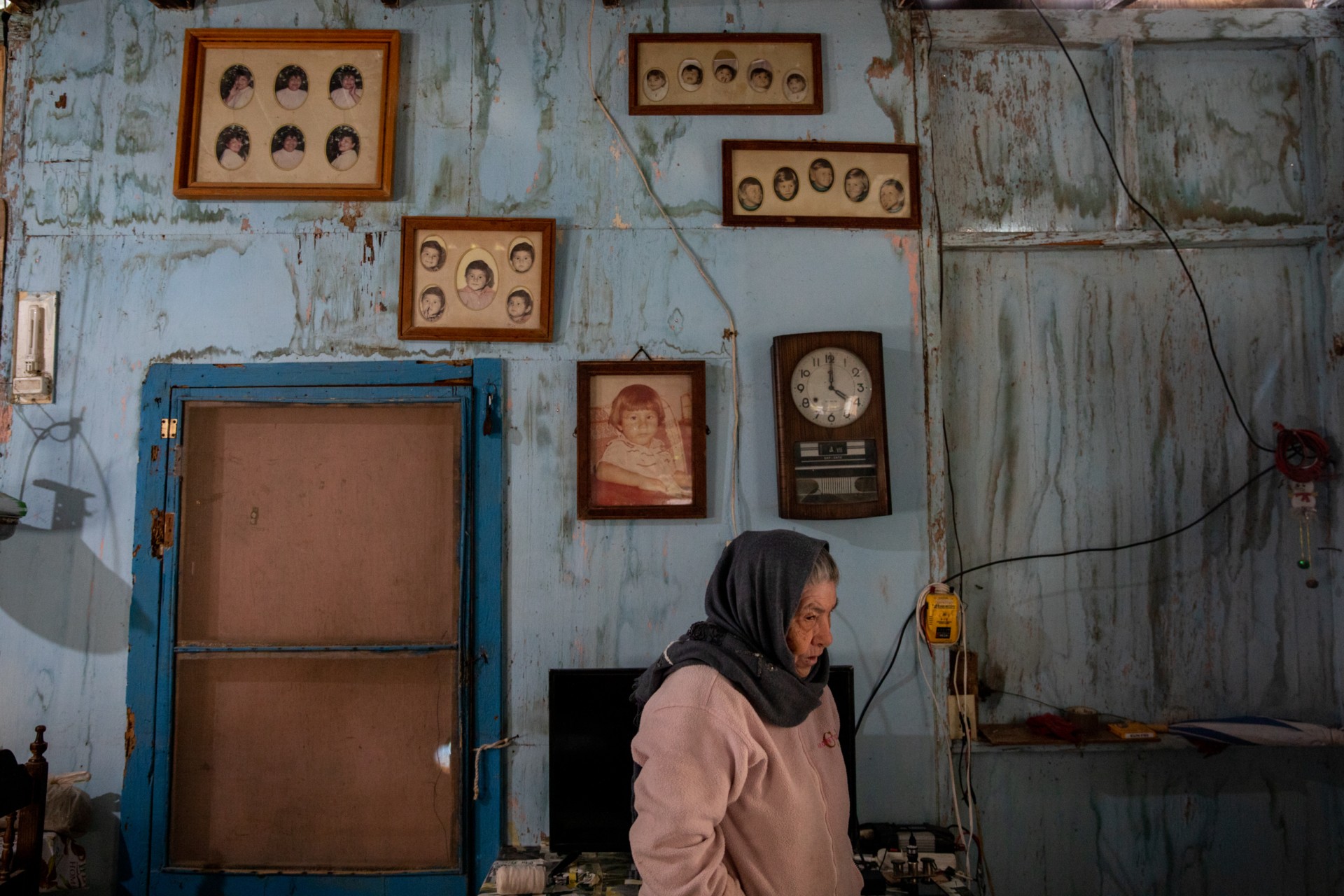
Project
Until We Are Gone
Extreme drought has pushed traditional subsistence communities and their heritage of living off the...



